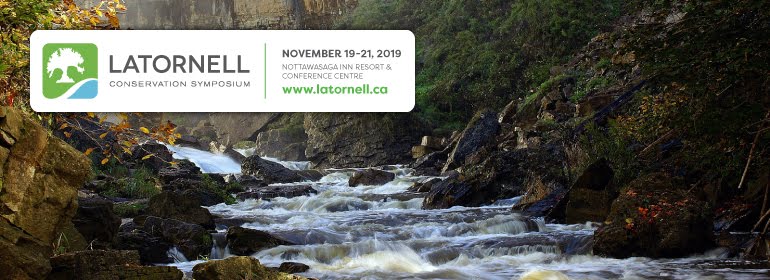It’s fair to say that the Latornell Conservation Symposium
is built on a foundation of three solid pillars - information sharing;
networking; and great food! Each year, our host facility, the Nottawasaga Inn
and Conference Centre in Alliston, creates a delicious and delectable menu that
never ceases to please. This year will be no exception, with their continued
commitment to source locally grown food and deliver new meal ideas and flavour
combinations.
Perhaps for lunch, the broccoli and cranberry salad with red
onions and pumpkin seeds will catch your interest, followed by a corn crusted
pork loin with caramelized onions and arugula pesto sandwich. And maybe for
dinner, you’ll be queuing up to enjoy the carved, slow roasted beef with a side
of vegetable succotash. Or if seafood is more your thing, how about white fish
cakes with garlic aioli or a fillet of roast salmon with carrot and leek
julienne and maple glaze?
And don’t think our vegetarian and food sensitive delegates
have been left out in the cold. In our survey feedback we’ve heard a growing
demand for more substantial vegetarian and gluten/dairy free dishes, and the
Nottawasaga Inn has responded! A few of the items lined up this year include
vegan rice paper salad rolls filled with a delectable array of flavour
combinations; baked corn pasta with spinach tomatoes and mushrooms; and layered
vegetables with refried beans and a corn tortilla crust! If it’s cold out, you
could always warm up with some freshly made leek and potato soup too.
The Gala Banquet evening this year has produced a menu that showcases
a variety of indigenous recipes you’re sure to enjoy. A veritable buffet of
delicious options, including sumac rubbed smoked pork loin; three sister soup;
summer squash with red onions and fresh herbs; as well as roasted yams and
potato salad with Prairie mustard. Top it all off with delectable desserts,
including pumpkin pie, maple pecan flan, wild rice pudding, carrot and walnut
cake, and the list goes on!
Come for the conference, stay for the food! Supporting local
growers and reducing our environmental impact is important to the Latornell
Steering Committee, and we’re thrilled with the Nottawasaga Inn’s commitment to
pursue these same ideals.
If you can’t wait to enjoy what the Nottawasaga Inn’s is
offering up this November, here’s a teaser!
CARROT AND GINGER SOUP
Ingredients
1 tbsp vegetable oil
1 medium onion, chopped
1 clove garlic, minced
2 tbsp chopped fresh ginger
1 lb carrots, peeled and chopped
1 medium yam, peeled and chopped
40 oz vegetable stock
salt and pepper to taste
In a large pot on medium heat cook the
onions in the oil.
When the onions are translucent add the
garlic, and ginger. Lower heat, cook about 4 minutes.
Add carrots, yam and vegetable stock,
bring to a boil.
Reduce heat to simmer. Cook until carrots
are nice and soft, about 25 minutes.
With an immersion blender, blend soup
until smooth. Add salt and pepper to taste. Serve hot!
This blog post contributed by Katie Jane Harris, Kawartha Conservation and Latornell Symposium Committee Member


